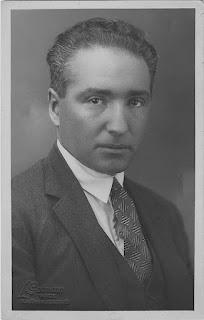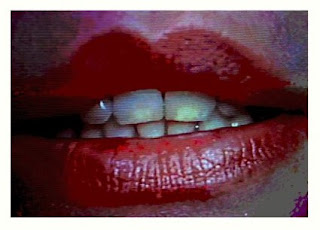Photo possibly by A. A. Brill (c. 1922)
Once we open up to the flow of energy within our body,
we can also open up to the flow of energy in the universe.
I. Opening Remarks
I could have featured Reich in my recent series on the grand perverts of Austria, but decided that he is such a unique figure that he deserves a post in his own right.
I'm not, however, very familiar with his work: I once read an English translation of Die Massenpsychologie des Faschismus (1933) [1] and a funny little book entitled Listen, Little Man! (1948), in which he outlined his political philosophy (an idiosyncratic form of libertarian socialism).
Mostly I know of Reich due to the fact that he's mentioned with admiration by Deleuze and Guattari in Anti-Oedipus (1983) [2].
That, and the fact that Kate Bush once wrote a song inspired by him [3].
II. The European Years
Wilhelm Reich was born in 1897, in Dobzau, Galicia, then part of the Austro-Hungarian Empire, but now in western Ukraine and awaiting the arrival of Russian bombs and soldiers.
Although both his parents were Jewish, Wilhelm was brought up to speak only German and punished for using Yiddish expressions, or playing with the local Yiddish-speaking children. Oy vey!
Wilhelm was homeschooled until the age of twelve. But when his mother was discovered
having an affair with his live-in tutor and soon afterwards committed suicide, he was sent off to an all boys' school. Reich would later write about these events in his first published paper, detailing his shame and guilt, but also expressing his own incestuous fantasies involving his mother.
After the War, in which he served on the Italian front, Reich headed for Vienna, where he enrolled in law at the University. However, he found the subject tedious and so switched to medicine. Although he found this much more to his liking, he rejected the mechanistic concept of life which then dominated in favour of a more vitalist philosophy.
In 1919, he had a fateful first meeting with Freud, from whom he had requested a reading list for a seminar on sexology. Interestingly, it seems they left an equally strong impression on one another and Freud smoothed the younger man's way into the Vienna Psychoanalytic Society and encouraged him to start meeting with patients of his own; one of whom, 19-year-old Lore Kahn, he was soon fucking, even though Freud had advised not to get romantically involved with patients.
Sadly, she became seriously ill and died shortly after the affair with Reich began [4]. Swiftly putting his grief to one side, he then seduced another patient, Annie Pink - an 18-year-old medical student and friend of Frl. Kahn's - though he did eventually do the decent thing and marry her, at the insistence of her father, and she went on to become a well-known shrink in her own right.
Despite what would now be regarded as gross professional misconduct (at the very least), Reich was apppointed deputy director of Freud's outpatient clinic and he worked there until 1930, forming his own theories on human psychology to do with repetitive patterns of behaviour, speech, and physical posture serving as ego defence mechanisms, or what he termed character armour.
Reich was highly regarded by his contemporaries and colleagues at this time and many found his lectures and seminars spellbinding. His first book was also well received and won him further professional recognition, including from Freud, who in
1927 arranged for his appointment to the executive committee of the
Vienna Psychoanalytic Society.
Thus, everything was coming up Rosen for Reich and he seemed to have a bright future ahead; despite one of his early patients protesting that Reich was, in fact, a psychopath; and despite the fact that Freud was increasingly concerned about the theory that psychic health depended upon the full discharge of libidinal energy.
Such ideas, tolerated at first within the psychoanalytic community, would later be ridiculed. And when Reich tried to reconcile his new theories with Marxism, he would increasingly be regarded as part sexual revolutionary and part sexual lunatic (although, to be fair, he was certainly not the only intellectual attempting to marry psychoanalysis and Marxism at this time).
In 1927, Reich opened half-a-dozen Sex-Pol clinics in Vienna, where members of the proletariat could receive free psychoanalysis, political instruction, and contraceptives. These proved so popular that Reich also took to the streets in a mobile clinic and began distributing sex-education pamphlets door to door.
This same year also saw publication of Die Funktion des Orgasmus, which he dedicated to Freud. Unfortunately, the latter was not overly impressed and took two months before sending a short thank you note (which didn't go down too well with Reich). Freud's view, essentially, was that it was an oversimplification to view everything in terms of orgastic potency.
In 1930, Reich and his wife moved to Berlin, where he continued his work and set up more Sex-Pol clinics. Although he joined the German Communist Party, his new comrades were troubled by his promotion of sexual freedom for everybody - including adolescents - and they eventually refused to publish his material.
And so Reich discovered that moral puritanism belongs as much on the radical left as the reactionary right.
Having said that, it was the Nazis who, in 1933, most vociferously attacked his work and forced him to flee Germany with his mistress, a dancer called Elsa Lindenberg. The couple initially retreated to Vienna, then moved to Denmark, Sweden, and finally settled in Norway, where he and Lindenberg were to remain for five years [5].
It was whilst in Oslo, that Reich attempted to ground his orgasm theory in biology, exploring
whether the libido was in fact a form of bio-electricity or a
chemical substance [6]. These investigations led on to his bion experiments, where he played Dr. Frankenstein and sought to create rudimentary new forms of life (and explain the origin of cancer).
Unsurprisingly, many within the scientific community in Norway expressed their scepticism regarding Reich's work. Whilst some simply dismissed his theories on bions as nonsense, others accused him of being ignorant of even basic scientific procedures and micro-biological facts. When in 1938 his visa expired, several scientists argued against this being renewed and his case became something of a cause célèbre in Norway [7].
When Reich eventually left Norway, he did so feeling a little humiliated and full of anger for those who had denounced him and ridiculed his work. The scandal - and his various love affairs - had also taken its toll on his relationship with Lindenberg. And thus when Reich asked her to accompany him to the United
States, she declined, leaving him to set sail all on his lonesome.
Details of Reich's American years can be found in part two of this post: click here.
Notes
[1] It was the 1983 Pelican edition, The Mass Psychology of Fascism, trans. Vincent R. Carfagno.
[2] For Deleuze and Guattari, Reich deserves credit for being the first to address the question of the relationship between
desire and the social field (and for daring to go further in this direction than Marcuse). Whilst admitting his work has its problematic aspects, they find Reich's comparison of sexuality with cosmic phenomena, such as electrical
storms or sunspot activity, preferable to Freud's "reduction of
sexuality to the pitiful little familialist secret" and it was Reich, more than anyone else, who upheld the great perverse truth of psychoanalysis, i.e., "the independence of sexuality with
regard to reproduction".
See: Gilles Deleuze and Félix Guattari, Anti-Oedipus, trans. Robert Hurley, Mark Seem, and Helen R. Lane, (University of Minnesota Press, 1983), pp. 291-92.
[3] Kate Bush, 'Cloudbusting', a single release from Hounds of Love, (EMI, 1985): click here to play and watch the offical video, dir. Julian Doyle, and ft. Donald Sutherland in the role of Wilhelm Reich.
[4] Lore Kahn's parents claimed that their daughter had died after a botched illegal abortion, possibly performed by Reich himself. Whilst recognising the tragedy of what happened, Reich also found his role within the young woman's death and subsequent suicide of her mother absurdly amusing, noting in his diary: 'I am acting out a comedy, while causing the people around me to die!'
[5] Hopes that he might be able to set up shop in London were dashed when it became clear that support from the psychoanalytic
circle in England was not going to be forthcoming. It had been decided that Reich had unresolved
hostility issues and was living in a world of his own.
The unique form of treatment Reich developed from 1930 onwards also caused eyebrows to be raised and alarm bells to sound. Based on touch, it involved patients stripping off and allowing him to perform a special type of massage in order to loosen their body armour (i.e., their muscular and characterological rigidity). In the hope of retrieving repressed childhood memories and triggering genuine feelings, Reich would also ask patients to physically simulate certain emotions (such as anxiety, rage, and ecstasy). If the session was successful, he claimed to see waves of pleasure move through the bodies of his patients (what he called the orgasm reflex or streaming). Initially wanting to call this new treatment orgasmotherapy, Reich evetually settled on the name of vegetotherapy (i.e., arousal therapy).
[6] In 1935, Reich also bought an oscillograph and attached it to student volunteers at the
University of Oslo, who agreed to touch and
kiss each other while he monitored the results. As you do ...
[7] The affair generated a good deal of press coverage throughout 1938, with
more than 165 articles and letters appearing in Norwegian newspapers,
the vast majority of which attacked Reich and his work.







